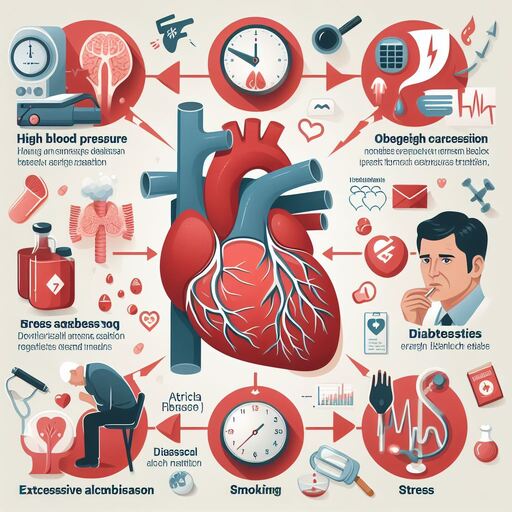Causes and Risk Factors of Atrial Fibrillation
Causes and Risk Factors of Atrial Fibrillation
Atrial fibrillation (AF) is a common heart condition that affects the upper chambers of the heart. It causes the heart to beat irregularly, which can lead to fatigue, shortness of breath, and other symptoms. Here are some causes and risk factors for AF:
Causes:
1. Age: As we age, the heart’s electrical system becomes less efficient, increasing the risk of AF.
2. Genetics: Some people may be more likely to develop AF due to their family history of the condition.
3. Health conditions: Certain health conditions, such as diabetes, hyperthyroidism, and sleep apnea, can increase the risk of AF.
4. Lifestyle factors: Smoking, excess weight, sedentary lifestyle, alcohol consumption, and stress can also contribute to the development of AF.
5. Medications: Certain medications, such as antihistamines and calcium channel blockers, can increase the risk of AF.
Risk Factors:
1. Age: The risk of developing AF increases with age, especially after the age of 40.
2. Gender: Women are more likely to develop AF than men.
3. Family history: Having a family member with AF can increase the risk of developing the condition.
4. Health conditions: Conditions such as diabetes, hyperthyroidism, and sleep apnea can increase the risk of AF.
5. Lifestyle factors: Smoking, excess weight, sedentary lifestyle, alcohol consumption, and stress can also contribute to the development of AF.
6. Medications: Certain medications, such as antihistamines and calcium channel blockers, can increase the risk of AF.
7. Medical procedures: Procedures such as cardiac catheterization or surgery can increase the risk of developing AF.
8. Comorbidities: Conditions such as hypertension, heart failure, and chronic kidney disease can also increase the risk of AF.
Causes and Risk Factors of Atrial Fibrillation
It’s important to note that while these are common causes and risk factors for AF, not everyone who develops the condition will have all of these factors. Additionally, some people may develop AF without any known risk factors or underlying medical conditions. If you have concerns about your heart health or are experiencing symptoms of AF, it’s important to speak with a healthcare provider to discuss appropriate treatment options.
Causes and Risk Factors of Atrial Fibrillation

